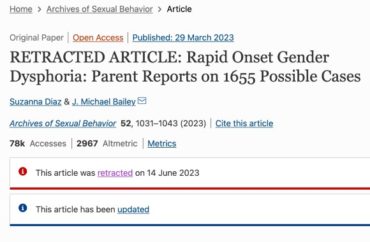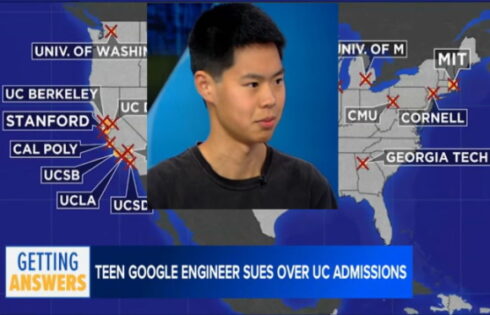
Some activists refused to accept evidence for rapid-onset gender dysphoria
A major academic journal retracted an article Wednesday on “rapid onset gender dysphoria,” a controversial theory rejected by many proponents of transgender ideology.
However, one of the paper’s authors said yesterday it would be published in a second journal and possibly in others. It can also be read online.
Stetson University Professor Christopher Ferguson asked paper co-author and Northwestern University psychology Professor Michael Bailey whether it will be republished. Bailey responded in the affirmative.
“Republishing in [Journal of Open Inquiry in Behavioral Science], journal for [Society for Open Inquiry in Behavioral Science],” Bailey wrote.
Republishing in JOIBS, journal for SOIBS, where you are a member. In fact, the open access publishing agreement (which we have) allows multiple republication.
— Michael Bailey (@profjmb) June 15, 2023
“In fact, the open access publishing agreement (which we have) allows multiple republication,” Bailey tweeted.
“During the past decade there has been a dramatic increase in adolescents and young adults (AYA) complaining of gender dysphoria,” according to the paper’s abstract. “One influential if controversial explanation is that the increase reflects a socially contagious syndrome: Rapid Onset Gender Dysphoria.”
“ROGD theory…proposes that common cultural beliefs, values, and preoccupations cause some adolescents (especially female adolescents) to attribute their social problems, feelings, and mental health issues to gender dysphoria,” according to the article.
“That is, youth with ROGD falsely believe that they are transgender, and that they must undergo social and medical gender transition to resolve their issues. A sharp increase in such false beliefs among adolescents and young adults has led to the recent ‘epidemic’ in ROGD.”
ROGD “was first described by the researcher Lisa Littman in 2018,” Colin Wright, a prominent critic of popular transgender theory, wrote Monday in City Journal.
“Diaz and Bailey’s new paper lent further credence to the ROGD hypothesis,” Wright wrote:
They examined parental reports of 1,655 potential ROGD cases through an online survey. The sample size dwarfed that of Littman’s original study, which was based on 256 parental reports. This data bolstered Littman’s findings about the onset of gender dysphoria after puberty, predominantly in girls, in conjunction with preexisting mental-health conditions, heavy social-media usage, and peer influence.
They also corroborated Littman’s 2018 finding that an overwhelming majority (90 percent) of concerned parents are politically progressive, undermining the common narrative that criticisms and concerns about gender affirmation originate in conservatism.
Springer Nature retracted the article from the journal Archives of Sexual Behavior; however, the entire article is still available to read online.
“ASB is a primary target for activist researchers who will not tolerate dissent from their views, and a months-long campaign by activists to pressure Springer Nature into retracting [the paper] has culminated in success,” according to Wright.
For its part, Springer Publishing explained that it retracted the paper because “the participants of the survey have not provided written informed consent to participate in scholarly research or to have their responses published in a peer reviewed article.”
“Additionally, they have not provided consent to have their data included in this article,” the editors continued. They added that “The authors disagree with this retraction.”
According to Wright “The parents [of the children described in the paper] were not only eager to provide information to enhance understanding of ROGD but also well-aware that the anonymized results would be published online.”
According to Bailey, “The sole intent of parental participation in the survey was to inform the scientific community about the novel presentation of gender dysphoria among youth with no prior history of the condition,” Wright wrote.
“Despite this, Springer chose to disregard the spirit of the consent requirement,” Wright continued. “Consent for the publication of anonymized data on a public website, it alleged, does not equate to consent for that data’s publication in a scholarly peer-reviewed article.”
“The activist playbook here was simple: get the Diaz and Bailey paper retracted over a technicality, then spin the retraction as an invalidation of the study’s main findings,” Wright stated.
MORE: Evolutionary biologist: two sexes exist
IMAGE: Springer Nature screenshot
Like The College Fix on Facebook / Follow us on Twitter





Please join the conversation about our stories on Facebook, Twitter, Instagram, Reddit, MeWe, Rumble, Gab, Minds and Gettr.